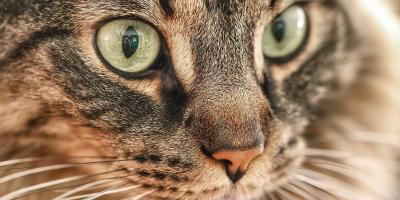
Having a cat can bring a lot of joy to your life. They have so much personality and seem to always be running around doing something cute or quirky. Whether it's climbing the curtains or trying to dig up your favourite potted plant, your cat is never short on things to do. But what about when the attention turns to you? While it's not something that all cats do, some owners wonder, "Why does my cat lick me?" The answer isn't just "because she can." Find out why your cat licks you and what you can do about it if it becomes a problem.
Why Does My Cat Lick Me?
When it comes to this question, there's no one right answer. There are many reasons why a cat may lick its owner. We cover some of the most common below. However, anytime you notice a change in your cat's behaviour, it's always a good idea to schedule a vet checkup to ensure there isn't some underlying medical issue that's causing that behaviour.
Your Cat Is Bonding With You
One of the most common reasons your cat may be licking you is because she is trying to bond with you. Cats lick themselves to self-groom, and this grooming behaviour can also be social. Mother cats lick their kittens to keep them clean and to show them affection, and cats that live together may lick each other to engage in social grooming.
So, what does this mean when your cat licks you? Probably that she likes you and wants you to know. She may be licking you to show affection or be keeping you clean because she cares. It can just be a natural instinct when your cat is happy and feeling social.
Your Cat Is Stressed or Anxious
Not all licking behaviour is good, though. Licking that becomes obsessive can be a sign that your cat is feeling stressed or anxious about something. This may be especially true if you notice that the licking behaviour isn't happening only with you. Your cat may also start obsessively licking the other animals in your household or objects, such as furniture or counters.
If you think that your cat is licking because of stress and anxiety, a veterinarian checkup is the first step. Your vet can rule out any medical issues that may be causing pain and give you some tips for helping to stop the behaviour. You might also think about any changes that have occurred in the house or family that may be stressing your cat out. Cats can be very sensitive, and bringing in a new baby, adopting a new animal or moving are all examples of events that could stress your cat out.
Your Cat Is Feeling Territorial
Cats may also lick to mark you as theirs. This is a natural behaviour that is tied to scent marking in the animal world. Animals leave their scents on the things they want to mark as part of their territories, and if your cat is licking you, she may be trying to leave her scent so any other cats or animals know that you're already spoken for. In most cases, this isn't an issue, but a cat that is licking to mark her territory may eventually show other territorial behaviours, which can become a problem.
Why Does It Hurt When My Cat Licks Me?
You may notice that when your cat licks you, it feels rough and may hurt a bit. This is especially true if your cat is licking excessively and in the same place. Cats are known for their sandpaper tongues, but there's science behind it. Because cats lick themselves for grooming purposes, it's important that their tongues be able to actually catch any dirt or loose fur so it can be removed. To help with this, your cat's tongue has special back-facing barbs called papillae. These barbs are the same material that your cat's claws are made of, which is why there's a hard, rough feel to your cat's tongue.
How Can I Stop My Cat From Licking Me?
If your cat is licking you occasionally to be social or show affection, it probably won't be a problem. But if it becomes excessive or you just don't want her to do it, there are some things you can do to help cut the behaviour back or completely out.
The best — and the easiest — way to get your cat to stop licking is to distract them. Giving your cat something else to focus on can take the focus off the licking and redirect their attention. One of the best ways to do this is to start a play session. When your cat starts to lick you, redirect them by getting out one of their favourite toys and waving it around to give them something else to chase, swipe at and chew on. Giving your cat a ball to play with is another good toy option.
You can also distract your cat with food. When she starts to lick, offer her one of her favourite treats. This is a very effective strategy but should be used sparingly because too many treats can have an adverse effect on your cat's health. It can lead to them gaining weight or losing interest in their food. It's also a good idea to do something between your cat licking you and offering them treats because, otherwise, they could think they are getting rewarded and lick even more.
To get more insights into quirky cat behaviours or find out how to take the very best care of your favourite feline, browse through our cat care archives.
Related articles



